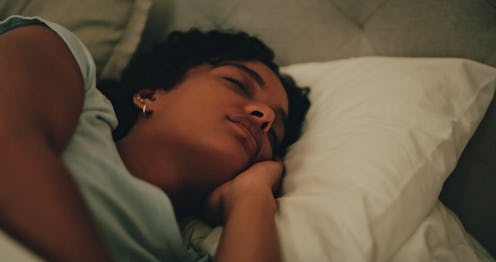Life
Why Sleeping On Vacation Is So Hard

The first night sleeping in a new place is often not the most restful, but if you've ever found yourself wondering exactly why you can't sleep in a different bed — one that isn't your own — science now understands why. Turns out that when you first sleep in a new place, one brain hemisphere stays more vigilant in order to monitor your unfamiliar surroundings. The extra mind action makes it kind of hard to enjoy a good night's sleep, so if you find yourself tossing and turning... well, at least it's a survival skill, right? You brain is just trying to look after you.
Though the "first night effect" — aka what scientists call that distinctly unrestful first night in a new place — has been well documented, until now there hasn't been much evidence suggesting what causes it. In a new study, though, researchers from Brown University monitored participants as they slept in unfamiliar surroundings. Using neuroimaging techniques and polysomnography, which measure things like brain waves and blood oxygen, researchers were able to determine that participants exhibited what's known as "interhemispheric asymmetry." In other words, one hemisphere of the brain was more active than the other. Specifically, in this study, the left hemisphere was more active than the right.
To further test why this might be happening, researchers played beeping sounds near either the left or the right ear while participants slept. They found that when sounds were played near the right ear, which stimulates the left half of the brain, the beeping sound had more of an effect on the person's sleep. After the first night, the beeping sound had significantly less effect on the sleepers, regardless of which ear it was near. In other words, the left hemisphere is not just more active; it's also being vigilant, monitoring for any potential threats in the unfamiliar surroundings the first night you sleep there.
From an evolutionary perspective, this makes a lot of sense. After all, when you're sleeping in a new place, you never know what sort of dangers might be lurking nearby; as such, it makes sense that the brain would want to be a little more alert in case you need to wake up quickly and defend yourself. It's a perfectly logical way to help ensure human beings stay alive — it's just massively inconvenient if you're on vacation.
So is there something we can do about it? Well, this is all still in the early stages. More research is needed to confirm these findings and further understand what might be going on, so it's unlikely that scientists will have a way to combat the "first night effect" any time soon. But in the meantime, since this effect seems to derive from the brain not feeling fully safe, if you're sleeping in a new place, you can try taking steps to make yourself feel as safe as possible. So no scary movies before bed, basically.
And you can also just make extra sure to practice tips for a better night's sleep in general.
Image: Getty Images (2)